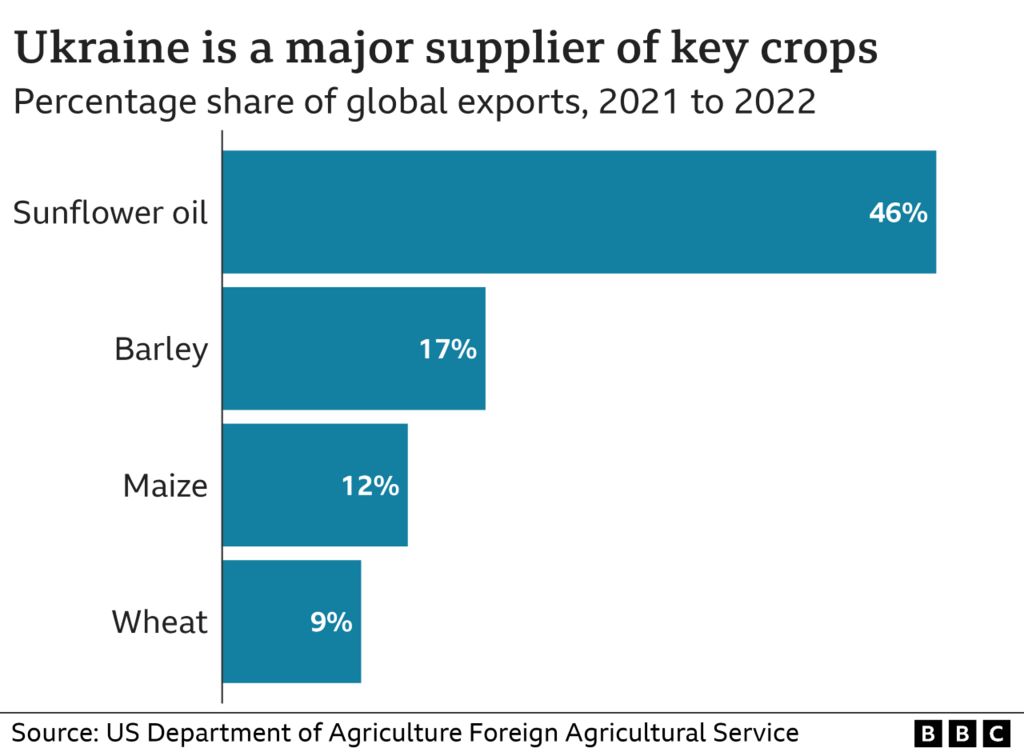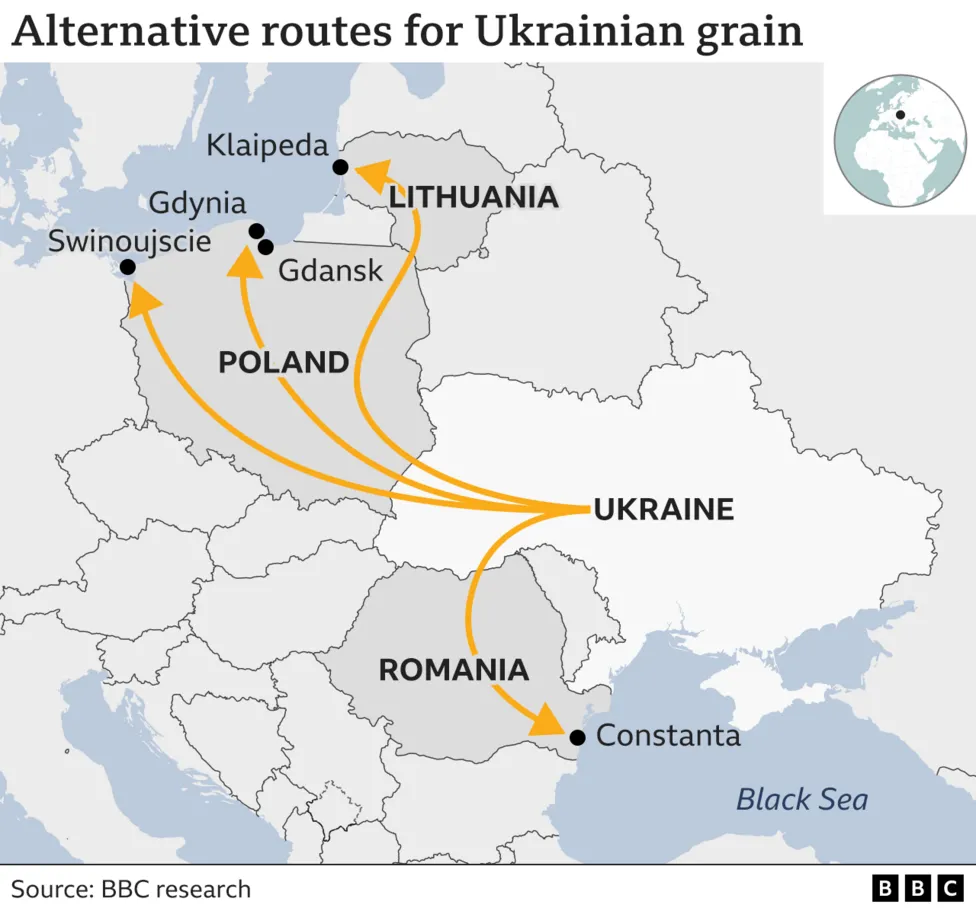Start your day with intelligence. Get The OODA Daily Pulse.
Start your day with intelligence. Get The OODA Daily Pulse.
Russia has notified Turkey, Ukraine and the UN that it will not renew a deal that allowed Ukraine to export grain through the Black Sea. Ukrainian wheat production plays a significant role in global food security due to its status as one of the world’s major wheat exporters. Ukraine is among the top wheat-producing countries, and its wheat exports contribute to meeting global food demand, especially in regions where wheat is a staple crop.
The agreement, known as the Black Sea Grain Initiatve, had reached a “de facto” end on Monday according to the Kremlin spokesperson Dmitry Peskov. The deal allowed cargo ships to pass through the Black Sea from the ports of Odesa, Chornomorsk and Yuzhny/Pivdennyi.
Moscow has stated it will return to the agreement if its conditions are met. Russian President Vladimir Putin has complained that portions of the deal that allow the export or Russian food and fertilizers have not been honored. He also argues that grain has not been supplied to poorer countries, which was a condition of the original deal. Russia also complained that Western sanctions are restricting its own agricultural exports. Russia’s foreign ministry reiterated these complaints on Monday. Turkish President Recep Tayyip Erdogan believes that Putin wants to continue the agreement and they will discuss the deal in person next month. This deal is significant because Ukraine is one of the world’s largest exporters of wheat, barley, maize and sunflower.
(Generated by OpenAI’s ChatGPT)
The Black Sea Grain Initiative is a cooperative effort aimed at enhancing collaboration and trade in grain and agricultural products among countries in the Black Sea region. It involves several countries located around the Black Sea, including Ukraine, Russia, Romania, Bulgaria, and others.
The initiative is focused on leveraging the agricultural potential of the Black Sea region, which is known for its fertile soils and favorable climate for grain cultivation. The main objectives of the Black Sea Grain Initiative include:
1. Promoting Trade and Export: The initiative seeks to facilitate and promote the export of grain and agricultural products from the Black Sea region to international markets. By working together, participating countries can coordinate logistics, share market insights, and jointly address trade barriers, leading to increased exports and improved market access.
2. Infrastructure Development: Enhancing the region’s infrastructure, such as ports, railways, and grain terminals, is an essential aspect of the initiative. Improving transportation and logistics networks can streamline grain shipments and reduce transportation costs, making Black Sea grain exports more competitive globally.
3. Information Sharing and Market Intelligence: The Black Sea Grain Initiative fosters information sharing and cooperation among member countries to provide market intelligence, crop forecasts, and data on grain production and demand. This facilitates better decision-making by grain producers, traders, and exporters.
4. Harmonization of Standards: The initiative aims to harmonize grain standards and quality specifications among participating countries. This standardization helps ensure that grains from the region meet international trade requirements and quality expectations.
5. Regional Stability and Cooperation: By promoting economic cooperation and collaboration in the agricultural sector, the Black Sea Grain Initiative aims to foster stability and dialogue among countries in the region.
The Black Sea region plays a vital role in global grain markets, with significant contributions to wheat, corn, and barley production. The initiative’s goal is to capitalize on this agricultural potential and strengthen the region’s position as a major player in the global grain trade.
It’s important to note that the Black Sea Grain Initiative operates in a dynamic geopolitical environment, and its activities may be influenced by various factors, including trade policies, political developments, and international relations among the participating countries.


When the UN brokered the deal, it told Russia it would help it increase its exports of grain and fertilisers. Although Western countries have imposed no sanctions on Russia’s agricultural products, Russia says the sanctions they did impose have deterred shipping firms, international banks and insurers from dealing with its producers.
Russia asked for its state-owned agricultural bank, Rosselkhozbank, to be reconnected to the Swift fast payment system (from which all Russian banks were barred in June 2022). The UN suggested that Russia set up a subsidiary of the bank, which would be allowed to use Swift – but Russia refused that option, saying it would take too long.
Other suggested schemes, such as processing payments for food and fertiliser through the US bank JPMorgan Chase, or through the African Export-Import Bank, also fell through. Russia says it will rejoin the deal if its conditions are met. Turkey’s President Recep Tayyip Erdogan says he will try to persuade Russia’s President Vladimir Putin to rejoin it when they meet in early August.
The EU has an existing plan for distributing Ukrainian grain which cannot be shipped through the Black Sea. It says it can be transported across Ukraine’s border with Poland and taken to ports on the Baltic Sea, or by rail and barge to the Romanian port of Constanta.

Since the start of the war, Ukraine has been sending about 10% of its grain exports across its land border with Poland. However, there are likely to be logjams if it exports more grain via this route. Ukraine’s railways have a different gauge to those in the rest of Europe, which means that every trainload of grain has to be transferred from one set of wagons to another at the border.
Also, the rail network in Eastern Europe does not have the capacity to transport to the Baltic ports and Constanta even the relatively low volumes of grain that Ukraine has been exporting by land up until now A lot of grain has stayed in countries such as Poland, Hungary, Romania, Bulgaria and Slovakia rather than being transported any further. It has glutted their markets and caused local food prices to crash. To protect farmers’ incomes in these countries, the EU has agreed to restrict Ukraine’s food exports there until 15 September.
This story is part of an investigation that includes the War Crimes Watch Ukraine interactive experience and and documentary, “Putin’s Attack on Ukraine: Documenting War Crimes.” (2)
(Generated by OpenAI’s ChatGPT)
1. Major Exporter: Ukraine is one of the largest exporters of wheat globally, consistently ranking among the top wheat-exporting countries. Its significant production capacity contributes to stabilizing wheat supplies in the international market.
2. Diversification: Ukrainian wheat exports add to the diversification of wheat sources, reducing dependency on a few wheat-exporting countries. This diversification is essential for global food security, as it helps mitigate risks related to weather events, crop failures, or trade disruptions in other wheat-producing regions.
3. Price Stability: By being a major wheat exporter, Ukraine’s wheat production helps stabilize wheat prices in the international market. In times of tight supply or increased demand, Ukrainian wheat exports can help meet the shortfall and prevent excessive price spikes.
1. Supply Shortage: If Ukrainian wheat exports were to destabilize due to factors like adverse weather conditions, political instability, or trade disruptions, there could be a significant reduction in global wheat supply. This could lead to shortages in importing countries, potentially affecting food security for vulnerable populations.
2. Price Volatility: Reduced Ukrainian wheat exports could result in increased price volatility in the global wheat market. With fewer supplies available, wheat prices may surge, impacting food prices and affordability for consumers worldwide.
3. Reliance on Other Exporters: Destabilized wheat exports from Ukraine may increase reliance on other major wheat-exporting countries. This could strain those countries’ production capacities and potentially lead to increased competition for limited supplies.
4. Food Crisis: In extreme cases, if there is a widespread disruption in global wheat supply due to destabilized Ukrainian exports and other factors, it could contribute to a food crisis in regions heavily dependent on wheat imports.
It’s essential to note that global wheat markets are influenced by various factors, including weather conditions, geopolitical events, trade policies, and economic developments. The implications mentioned above are hypothetical scenarios, and the actual impact would depend on the specific circumstances and responses from various stakeholders, including governments, international organizations, and the private sector.
To safeguard global food security, it is crucial for countries and the international community to focus on building resilient and sustainable agricultural systems, diversifying food sources, promoting responsible trade practices, and investing in research and innovation to enhance agricultural productivity.
https://oodaloop.com/archive/2023/05/29/global-food-security-grain-shipments-from-ukraine-and-tracking-russias-phantom-ships/
https://oodaloop.com/archive/2023/04/25/the-future-of-food-insecurity-and-agriculture-cybersecurity-grain-hoarding-rice-shortages-and-the-war-in-ukraine/